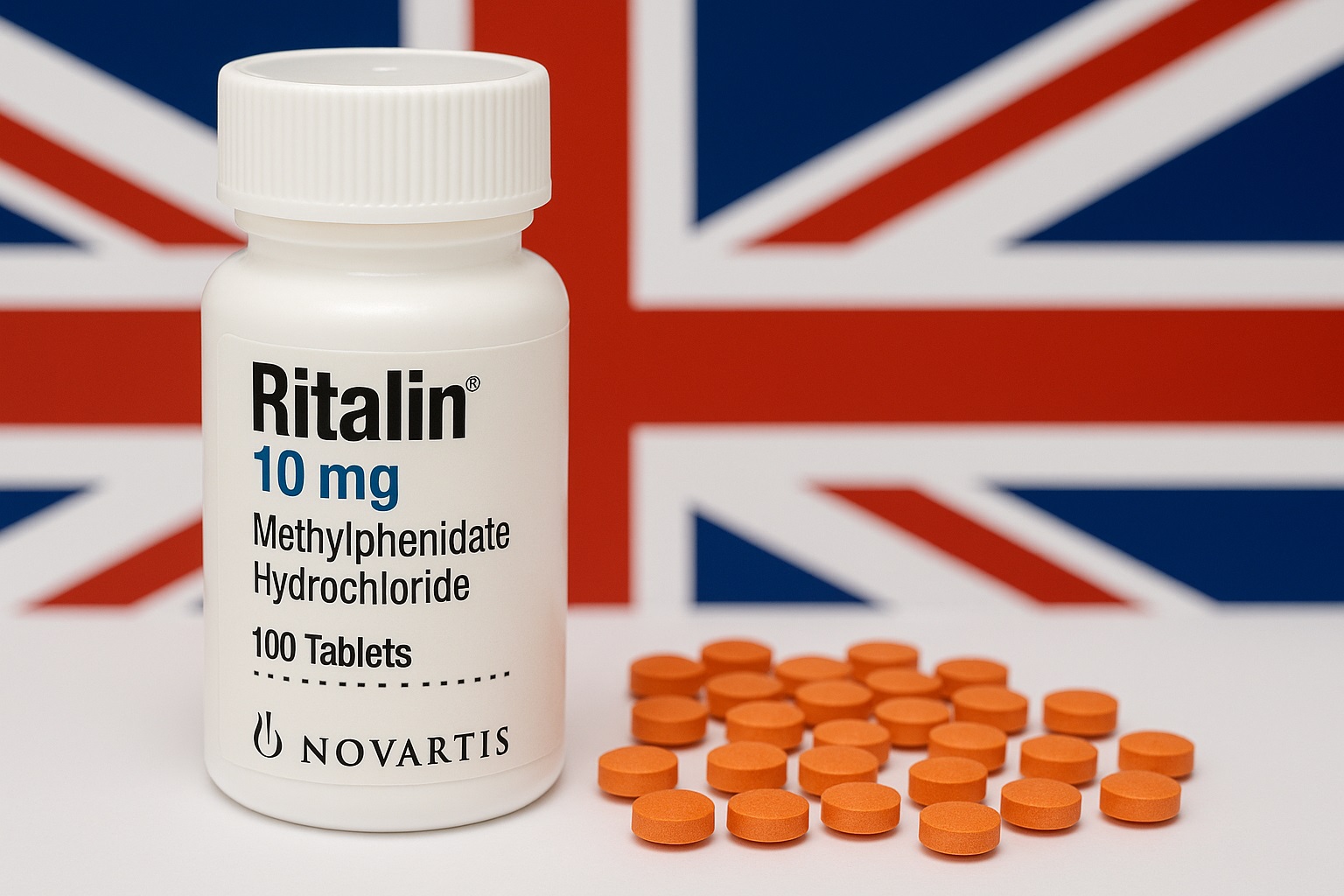Ritalin, the brand name for methylphenidate, is a central nervous system stimulant widely recognized for its role in managing attention deficit hyperactivity disorder (ADHD) and, in some cases, narcolepsy. In the United Kingdom, its use is tightly regulated due to its potential for misuse and dependence, reflecting a balance between therapeutic access and public safety. Governed by the Misuse of Drugs Act 1971 and overseen by bodies like the Medicines and Healthcare products Regulatory Agency (MHRA), Ritalin’s legal framework ensures controlled access while addressing rising ADHD diagnoses. This article examines drug’s classification, prescription requirements, approved uses, penalties for misuse, and travel considerations to Ritalin in the UK, providing a comprehensive view as of September 2025.
Classification as a Controlled Drug
Ritalin in the UK is classified as a Class B controlled drug under the Misuse of Drugs Act 1971 and listed under Schedule 2 of the Misuse of Drugs Regulations 2001. This places it alongside substances like amphetamines, reflecting its recognized medical use but also its potential for abuse due to its stimulant properties. As a Schedule 2 drug, Ritalin is subject to strict controls on prescribing, dispensing, and storage to prevent diversion. For comparison, modafinil in the UK, another wakefulness-promoting medication used for narcolepsy, is classified as a prescription medicine but not a controlled drug, allowing less stringent oversight. The Home Office and MHRA enforce these regulations, ensuring that only authorized professionals handle its distribution.
Approved Uses and Prescription Requirements
Ritalin is approved in the UK for the treatment of ADHD in children aged 6 and older, as well as for narcolepsy in adults, under the brand names Ritalin, Concerta, and others. It is not licensed for adult ADHD, though off-label prescribing occurs under specialist supervision. The National Institute for Health and Care Excellence (NICE) recommends methylphenidate as a first-line treatment for ADHD when non-pharmacological interventions are insufficient, with diagnosis confirmed via DSM-5 or ICD-11 criteria. Atomoxetine in the UK, a non-stimulant alternative for ADHD, is often prescribed when Ritalin is ineffective or causes intolerable side effects, offering a lower risk of abuse.
Prescriptions must be issued by specialists, such as psychiatrists or pediatricians, and dispensed within 28 days, with no refills permitted without a new prescription. Pharmacies maintain secure storage and detailed records, aligning with Controlled Drugs Regulations. Dosing typically starts at 5 mg twice daily for children, titrating up to a maximum of 60 mg daily (or 54 mg for Concerta XL), with regular monitoring for side effects like insomnia or appetite loss. NHS coverage is standard, but private prescriptions may be needed for off-label uses, increasing costs.
Penalties for Misuse and Diversion
Possession of Ritalin without a valid prescription is a criminal offense under the Misuse of Drugs Act, carrying penalties of up to 7 years in prison, an unlimited fine, or both for Class B violations. Supplying or distributing Ritalin illegally—such as selling or sharing—also incurs up to 7 years’ imprisonment, with intent to supply potentially escalating to trafficking charges. First-time offenders may face lighter penalties, such as fines or community orders, depending on quantity and intent. Bupropion, sometimes considered off-label for ADHD but primarily used for depression, is not a controlled drug in the UK, reducing legal risks associated with its possession. The UK’s Prescription Medicines Code of Practice Authority monitors illicit online sales, with enforcement actions targeting unregulated vendors.
Travel and Import Regulations
Travelers carrying Ritalin within the UK or internationally must adhere to strict guidelines due to its controlled status. Within the UK, patients need a valid prescription or a letter from their prescriber detailing the medication, dosage, and medical necessity. For international travel, a Home Office personal license is required for quantities exceeding a 3-month supply or if entering countries with stringent drug laws. Importing Ritalin for personal use is permitted with a prescription, but amounts are limited to 3 months, and customs may request documentation. Online purchases from overseas vendors are risky, as methylphenidate shipments without a prescription may be seized, and buyers could face legal action.
Current Trends and Oversight
The use of Ritalin in the UK has surged with NHS data showing over 1.5 million prescriptions in 2023, driven by increased ADHD awareness. Concerns about misuse, particularly among students using it as a “study drug,” have prompted tighter monitoring through Prescription Drug Monitoring Programs (PDMPs). The MHRA and Home Office collaborate to track diversion, with recent initiatives targeting illegal online pharmacies. No changes to Ritalin’s Class B status are proposed as of 2025, but ongoing pharmacovigilance assesses risks like cardiovascular effects and psychiatric symptoms. Supply chains remain stable, with generic methylphenidate options reducing costs compared to branded Ritalin.
Result
Ritalin’s legal status in the UK as a Class B, Schedule 2 controlled drug reflects its therapeutic value for ADHD and narcolepsy, balanced against its potential for misuse. Strict prescription and dispensing rules, enforced by the MHRA and Home Office, ensure controlled access, while penalties deter illegal possession or distribution. Travelers and patients must navigate specific regulations to comply with domestic and international laws. As ADHD diagnoses grow, Ritalin remains a cornerstone of treatment, but its controlled status underscores the need for medical oversight. Consulting healthcare professionals is essential for safe, legal use.
